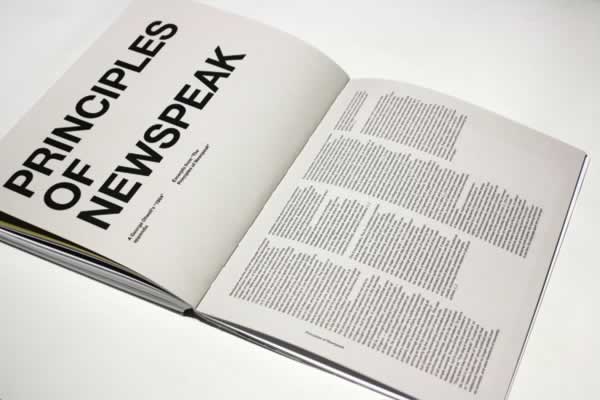 Writer Paul Constant went to Startup Riot in Seattle and the end result is his wonderfully caustic article titled Yesterday, I Went to the American Idol for Startups. It Made Me Want to Die. It’s a deliciously nasty diatribe against the vapid jargon that’s become the lingua franca at gatherings where people from software, web and mobile startups come to do show-and-tell.
Writer Paul Constant went to Startup Riot in Seattle and the end result is his wonderfully caustic article titled Yesterday, I Went to the American Idol for Startups. It Made Me Want to Die. It’s a deliciously nasty diatribe against the vapid jargon that’s become the lingua franca at gatherings where people from software, web and mobile startups come to do show-and-tell.
An outsider to startup culture, Constant didn’t write the sort of breathless paean that often graces the pages of business magazines or tech news web sites, in which brash software peddlers are praised for their technical mastery or business acumen (or in some rare cases, their dashing good looks). Instead, he told a horror story of Stepford software-mongers parading inconsequential ideas in an orgy of self-congratulation, all the while doing “brutal violence to the English language, to leave the spoken and written word bloodied and victimized on a cold cement floor, wishing for the sweet relief of death.”
 It would be Visual Basic-easy to dismiss Paul Constant’s critique by characterizing him, as one commenter on Hacker News put it, as “basically one type of hipster raging against the hipsterisms of a different type of hipster.” His bio page provides more than enough ammunition for that task, starting with the (presumably) ironically-self aware photo, which I’ve included on the left. It says that he’s the book editor for The Stranger, Seattle’s alternative weekly newspaper, and that his career comprises either writing for various U.S. alt-weeklies or working at book stores, namely the evil chain store Borders (which rates a parenthetical “ugh”) and Seattle’s wonder independent Elliott Bay Book Company. Simply put, he’s the stereotypically snobbish graduate of a liberal arts program, the sort of person for whom concepts like talent, work and ambition are anathema, and for whom the combination is the anti-Trinity; an unholy menage a trois starring Satan, the Anti-Christ and Barney the Purple Dinosaur. His disgust seems akin to the low regard in which wealthy Victorians held the ascendant merchant class (the word “career” has its roots in the rich of that era comparing people who worked for a living to rats careering — as in “running about — to and fro).
It would be Visual Basic-easy to dismiss Paul Constant’s critique by characterizing him, as one commenter on Hacker News put it, as “basically one type of hipster raging against the hipsterisms of a different type of hipster.” His bio page provides more than enough ammunition for that task, starting with the (presumably) ironically-self aware photo, which I’ve included on the left. It says that he’s the book editor for The Stranger, Seattle’s alternative weekly newspaper, and that his career comprises either writing for various U.S. alt-weeklies or working at book stores, namely the evil chain store Borders (which rates a parenthetical “ugh”) and Seattle’s wonder independent Elliott Bay Book Company. Simply put, he’s the stereotypically snobbish graduate of a liberal arts program, the sort of person for whom concepts like talent, work and ambition are anathema, and for whom the combination is the anti-Trinity; an unholy menage a trois starring Satan, the Anti-Christ and Barney the Purple Dinosaur. His disgust seems akin to the low regard in which wealthy Victorians held the ascendant merchant class (the word “career” has its roots in the rich of that era comparing people who worked for a living to rats careering — as in “running about — to and fro).
To dismiss Constant’s screed would be wrong for a number of reasons. To begin, it’s a petty argumentum ad hominem kind of retort, the last resort of someone who’s losing the argument. There’s also the fact that he writes so damned well. Armed only with the English language, he does more than merely report what happened — he paints a picture of the event, complete with too-seldom mots justes (when’s the last time you read the word “gossamer”?), memorable turns of phrase and apt metaphors.
Most importantly: he makes a couple of good points.

He writes (the emphasis is mine):
I don’t mean to say that these Startup Rioters are bad people, or that people like this have never existed before. Nostalgia is a cunning trap. These are men and women who want to make a living, and they have ideas they believe are valuable, and they want to communicate those ideas, just like everyone else who has ever lived.
…
The big problem is the cliches and extraneous words. This world of business, these job creators, have specialized to the point where they have developed their own language. This is normal, but the problem is that their language is as tepid and lifeless and dumb as any language that ever existed.
There’s no excuse for this. The startup culture largely comprises people from the right side of the bell curve, many of whom have had the benefit of higher education or its equivalent. If you argue that those of us who opted for the algorithms course over creative or essay writing have earned a pass, I will counter that we are equally fussy about language, just in a different way. We’ve all argued about the merits over language A over language B and readable code. Our code doesn’t work if it doesn’t clearly and intelligently communicate our intent to the computer, and it isn’t maintainable if it doesn’t clearly and intelligently communicate our intent to other programmers.
Here’s another complaint of his with which I agree wholeheartedly:
There are no words, no photographs, no graphic design. It’s all “content,” which is “consumed.”
I hate this use of the word “content”. I don’t know what’s to blame: the business view in which everything is simply a generic widget to be either bought or sold, the developer view in which everything is just data to be stored, transferred or crunched, or some toxic Reese’s Peanut Butter Cup of the two. Referring to writing, illustrations, spreadsheets, photographs, music, videos, blueprints and so on — the very reason we use our wonderful computing gadgets — as “content” put them in second place, reversing the natural order. People don’t get things done in order to use software, they use software to get things done.
I hate this use of the word “consume” even more. Jerry Michalski hit the nail on the head when he said the word makes us sound like “living gullets whose only purpose is to gulp down products and crap out cash.”
For extra credit: Watch the keynotes where Steve Jobs introduces the iPad and Steve Ballmer and company introduce the Surface tablet. Count the number of times the word “content” and “consume” or “consumer” appear in each. Note the difference.
Here’s the conclusion of the article:
You can do anything you want with an idea. It can be as big as you want. It doesn’t have to solve a minor problem that nobody ever really realized was a problem. It doesn’t have to fit into something the size of a button crammed into a “folder” the size of a button on a screen the size of a playing card. But everywhere I look, I see tiny little ideas, ideas that are almost petty in their inconsequentiality. And I come back to those cliches, and I think the real problem is in how little thought goes into the language these people use. When the language you employ to communicate your ideas is small and boring, your ideas are going to be small and boring. And when all your ideas are small and boring, your future gets dimmer and dimmer and more claustrophobic until it’s finally just a pinpoint of light on a dark screen, in danger of going out at any time.

If you’ve read 1984, you should be reminded of the Newspeak language, whose purpose was to reduce the scope of thought by reducing the scope of the language to express it. “It’s a beautiful thing, the destruction of words” is a line uttered in the book by a Newspeak dictionary editor, and it’s meant to be appalling. We, as people for whom ideas are building material, should be just as appalled when we practice “linguistic nihilism” in our work.

Here’s the reason you should hire me: I’m a techie who can communicate very well. I don’t sound like the people who made Constant want to die.
Go ahead, re-read the paragraphs above if you need proof of my ability to string words and pictures together into an enjoyable, cogent essay. Read the back catalogues of articles in my personal blog, The Adventures of Accordion Guy in the 21st Century, and in my tech blog, Global Nerdy. Take a look at my latest project on GitHub: inPulse Magic 8-Ball, a tutorial on developing apps for the inPulse smartwatch.
I also give great presentations, in which I make my explanations clear and lively, with a minimum of jargon. Here’s HTML5 and RIAs: Friends with Benefits, in which I talk about HTML5 and rich internet application plug-ins such as Flash and Silverlight:
Yes, that’s my velvety-smooth voice.
Here’s one of my most popular live presentations, Squeezeboxes, Startups and Selling Out, a “pep talk” I gave at CUSEC 2009, a conference for computer science and engineering students:
And finally, as proof that I can do presentations with any competent and cooperative co-presenter, here’s an episode of the children’s web show Developer Jr., where my co-host is a puppet:
If that’s not enough, I can also rock out. On the accordion.
I understand technology and I know how to communicate ideas to other people. Simply put, I’m a tech evangelist. If you have a software company, whether it’s a one-person startup or a Fortune 500 company, you just might need someone like me. I’ll augment your good ideas with mine, and I’ll tell the story of what your software can do, in a way that no one else can.
Here’s my LinkedIn profile; here’s my resume [107KB PDF].

3 replies on “Why You Should Hire Me”
[…] Why You Should Hire Me is an article on my tech blog, Global Nerdy, and the title is self-explanatory. If you’re looking for a techie who also has communication skills, I’m your guy. […]
[…] case you missed it, be sure to read the article Why You Should Hire Me on my tech blog, Global […]
This SJ classic should also be required viewing for all software developers https://www.youtube.com/watch?v=FF-tKLISfPE